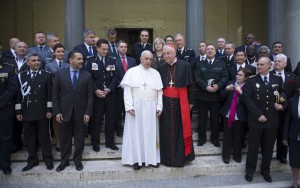http://beccajcampbell.com/books/why-character-matters-in-story-amreading-suspense-dystopian/ Archbishop Peter Smith’s Homily for Christmas and the Year of Mercy
“The people that lived in darkness had seen a great light. On those who live in the land of deep shadow, a light has shone.” These themes of light and darkness were often used in the ancient world as symbols of people’s experience of life. Light associated with goodness, knowledge and hope. Darkness symbolised evil, ignorance and despair. In the time of the prophet Isaiah, the Israelites were an embattled people, oppressed by foreign powers and driven into exile. In those dark days they were convinced that the God of their fathers had abandoned them and in their misery pleaded with God to have mercy on them. God responded to their plea through the prophet giving them hope that he would indeed come and save them, for there is a child born for us, a son given to us and this is the name they give him: Wonderful Counsellor Mighty God, Eternal Father, Prince of Peace. As Christians we believe that this promise was fulfilled on the first Christmas night when God became man, in the person of Jesus Christ, the long awaited Messiah, the saviour and redeemer of the world, – Emmanuel, “God with us!”. That was the astonishing joyful news announced to the shepherds on the first Christmas night, “Listen I give you a great joy, a joy to be shared by the whole people. Today in the town of David a saviour ahs been born to you. He is Christ the Lord.” And that truth is reiterated in St John’s gospel, when John says of Jesus Christ, all that came to be had life in him and that life was the life of men, a light that shines in the dark, a light that darkness could not overpower. The true light that enlightens all men because in him we see made visible the God we cannot see. So whilst our hearts are filled with hope and joy tonight we can’t ignore or forget the pain and tragic experiences of so many people in the world today nor the heartbreaks and sadness witch arise from time to time in our own lives and in the lives of others. I’m thinking especially of the terrifying events in Paris just over a month ago, the persecution of Christians and many others, the refugee crisis in the Middle East and other parts of the world, famine in Ethiopia and extreme poverty and lack of education in other countries. The list is endless. These tragedies remind us that the world is still in need of redemption from sin and evil. As Christians we believe that the work of salvation and redemption is literally a labour of love and mercy which God pursues through, with and in Jesus Christ by the power of the Holy Spirit. That process of redemption has to be worked out through every age until the second coming of Christ at the end of time. By taking on our wounded humanity he became our brother our closest friend and companion on the road of life sharing our pain and isolation, came to share our lives intimately, to show us how to carry our burdens and share in his example of how to care for those most in need. He is our model for Jesus said of himself: “I am the way the truth and the life.” And he came to show us the way back to the house of our heavenly father, the prodigal father, slow in anger and rich in mercy who waits with infinite passion and patience the final eternal home of all his children so for us and all people of good will Christmas is pre-eminently a season of joy and hope The challenge for each one of us of us is to allow Jesus to be born again in our hearts, to allow his love mercy and compassion to become incarnate in our heart and minds so that in our own times we too might be lights in a world that has become so dark with selfishness and sin. And in this Jubilee Year of Mercy Pope Francis is calling all Christians and all people of good will to a profound conversion of heart turning away from selfishness and self interest to reveal in our lives that infinite love and merry of God making our own unique contribution to the task of healing human brokenness, to foster peace and harmony in human relationships and through the corporal works of mercy feeding the hungry, giving drink to the thirsty, clothing the naked, healing the sick so to bring a little of Christ’s life into the darkness of the world in which we live. So my prayer for you all tonight is that message of Christ will find a home in us and that the peace of Christ may reign in our hearts tonight and throughout the coming year. And let us all commit ourselves to living this Year of Mercy, and in doing what we can to help all those in need we can be quite sure that God will show mercy to us too.

